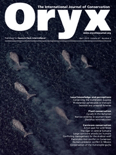
ORYX
Scope & Guideline
Fostering Collaboration in Ecology and Evolution
Introduction
Aims and Scopes
- Biodiversity Conservation:
The journal emphasizes the importance of preserving biodiversity through research that highlights endangered species, habitat conservation, and restoration efforts. - Human-Wildlife Interactions:
Research on human-wildlife conflict and coexistence is a key focus, exploring the socio-economic and cultural dimensions of conservation and how communities can effectively manage their interactions with wildlife. - Ecological Research:
ORYX publishes studies that employ various ecological methodologies, including field studies, modeling, and monitoring techniques to assess the health of ecosystems and species populations. - Policy and Management Strategies:
The journal addresses the intersection of conservation science and policy, providing insights into effective management strategies and frameworks that inform decision-making. - Community Engagement and Capacity Building:
Research that highlights the role of local communities in conservation, including participatory approaches and capacity building, is a core area of interest. - Climate Change and Conservation:
The effects of climate change on biodiversity and conservation strategies are increasingly addressed, with papers exploring adaptive management and mitigation practices. - Emerging Conservation Technologies:
The journal highlights innovative technologies and methodologies in conservation, such as remote sensing, genetic studies, and citizen science initiatives.
Trending and Emerging
- Integrated Conservation Approaches:
There is an increasing focus on integrated conservation strategies that combine ecological, social, and economic factors, promoting a more holistic understanding of conservation challenges. - Climate Resilience and Adaptation:
Research addressing the impacts of climate change on biodiversity and the development of adaptive management strategies is gaining prominence, highlighting the urgency of climate action in conservation. - Community-Based Conservation:
An upward trend in studies emphasizing community involvement in conservation efforts is evident, showcasing successful case studies and the importance of local knowledge. - Wildlife Trade and Trafficking:
Research on the dynamics of wildlife trade, including illegal trafficking and sustainable use, is increasingly featured, reflecting global concerns over biodiversity loss. - Technological Innovations in Conservation:
The use of technology, such as drones, remote sensing, and genetic tools, is on the rise, enabling more precise monitoring and management of wildlife and habitats. - Human Dimensions of Conservation:
A growing body of work examines the socio-economic factors influencing conservation outcomes, including human attitudes, behaviors, and the socio-political landscape affecting biodiversity.
Declining or Waning
- Traditional Ex Situ Conservation:
Research on ex situ conservation methods, such as captive breeding, has decreased as there is a growing emphasis on in situ conservation and habitat restoration. - Single Species Focus:
There has been a decline in studies that focus solely on single species conservation efforts, with a shift towards more holistic approaches that consider ecosystem health and interspecies relationships. - Historical Biodiversity Assessments:
Research that primarily focuses on historical assessments of biodiversity without current relevance or application is becoming less frequent, as the field moves towards actionable, contemporary studies. - Generalized Conservation Strategies:
Papers presenting generalized strategies without localized context or community engagement are waning, as there is a push for tailored, context-specific conservation approaches. - Overreliance on Traditional Ecological Knowledge:
While traditional ecological knowledge remains valuable, there is a decreasing number of studies solely based on it, as the integration of scientific methodologies becomes more prevalent.
Similar Journals

Conservation Science and Practice
Innovating pathways to sustainable ecological practices.Conservation Science and Practice, published by WILEY, is a leading open access journal dedicated to advancing research and practice within the fields of ecology, environmental science, and conservation. Since its inception in 2019, this prestigious journal has quickly established itself as a vital resource for scholars and practitioners alike, holding impressive Quartile rankings in Ecology (Q1), Environmental Science (miscellaneous) (Q1), Global and Planetary Change (Q2), and Nature and Landscape Conservation (Q1) as of 2023. With a strong commitment to disseminating high-quality, peer-reviewed research, it serves as a platform for innovative solutions to the complex challenges faced in conservation today. The journal is accessible to a global audience, promoting the dissemination of critical findings that inform policy and practice in diverse settings. Researchers, professionals, and students looking to stay at the forefront of conservation science will find invaluable insights and developments within its pages. Join the conversation in shaping sustainable futures through cutting-edge research in Conservation Science and Practice.
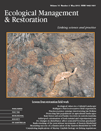
ECOLOGICAL MANAGEMENT & RESTORATION
Fostering sustainable ecosystems through rigorous research.Ecological Management & Restoration is a premier international journal published by Wiley, dedicated to advancing the fields of ecology, environmental management, conservation, and restoration practices. With an impact factor that positions it in the Q2 category across various ecological and management domains, this journal serves as a critical platform for researchers and professionals seeking to address contemporary issues related to ecosystem health, biodiversity, and sustainable management. Covering a wide range of topics from ecological restoration techniques to policy impacts on nature conservation, the journal caters to a diverse audience and contributes to the scientific community's understanding of environmental challenges. Importantly, the journal provides significant visibility, ranking in the top percentiles within key ecological research arenas such as Nature and Landscape Conservation, reinforcing its value for researchers aiming to influence both scientific thought and practical applications in ecology and management. The journal's commitment to disseminating high-quality research makes it an essential resource for students, researchers, and practitioners dedicated to fostering a sustainable future.
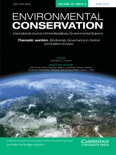
ENVIRONMENTAL CONSERVATION
Connecting Research and Policy for Lasting ChangeENVIRONMENTAL CONSERVATION, published by Cambridge University Press, is a premier academic journal dedicated to advancing the field of environmental science and conservation. Since its inception in 1974, this journal has established a robust reputation, currently holding prestigious rankings in various categories including Q1 in Nature and Landscape Conservation and Q1 in Water Science and Technology, alongside notable Q2 rankings across several related fields. With its broad scope, ENVIRONMENTAL CONSERVATION covers critical topics in health, toxicology, pollution control, and environmental policy, making it an essential resource for researchers, professionals, and students aiming to address the pressing challenges of environmental sustainability. Despite not being an open-access journal, its impactful content, demonstrated by its significant positions in Scopus rankings, enhances scholarly discourse and informs policy worldwide. As we approach its 50th anniversary, this journal remains pivotal in fostering innovative research and promoting best practices in environmental stewardship.
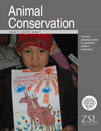
ANIMAL CONSERVATION
Advancing Knowledge to Safeguard Our Planet's Biodiversity.Animal Conservation is a prestigious journal that serves as a vital platform for the dissemination of research dedicated to the preservation of wildlife and habitats. Published by Wiley, this journal has established a significant presence in the fields of Ecology and Nature and Landscape Conservation, holding a distinguished Q1 category ranking for both in 2023. With an impressive Scopus rank of #25 in the realm of environmental science, it caters to a global audience keen on understanding and addressing pressing conservation issues. The journal provides researchers, professionals, and students with high-quality, peer-reviewed articles that explore innovative methods and strategies in animal conservation. With its continuous publication since 1998, encompassing a comprehensive range of topics, Animal Conservation is indispensable for anyone aiming to make impactful contributions to the field of ecology and conservation biology.

Global Ecology and Conservation
Leading the way in ecology and conservation science.Global Ecology and Conservation, published by Elsevier, stands as a premier open-access journal dedicated to advancing the field of ecology and conservation science. Since its inception in 2014, the journal has facilitated the dissemination of high-quality research, fostering critical dialogue on ecosystem management, biodiversity preservation, and sustainability practices across the globe. With a remarkable ranking within the top quartiles (Q1) in various categories including Ecology, Evolution, Behavior and Systematics, and Nature and Landscape Conservation, it is positioned among the leading resources for researchers and professionals alike. The journal has garnered a notable impact, ranking #65 out of 721 in Ecology, and houses articles that are vital to understanding and addressing the pressing environmental challenges of our time. Available in an open-access format, researchers can freely access and share vital findings, promoting a collaborative approach to ecological research. Global Ecology and Conservation is not just a publication; it is a critical tool for innovation and advocacy in conservation, poised to inspire the next generation of environmental stewards.

Frontiers in Conservation Science
Championing Research for Earth’s Enduring EcosystemsFrontiers in Conservation Science, published by Frontiers Media SA in Switzerland, is an esteemed open-access journal dedicated to advancing research in the field of conservation science. With an E-ISSN of 2673-611X, this journal aims to facilitate the exchange of knowledge among researchers, professionals, and students by publishing high-quality, peer-reviewed articles that explore innovative solutions to contemporary conservation challenges. Since its establishment in 2020, the journal has rapidly ascended to a Q2 ranking in the Nature and Landscape Conservation category, reflecting its commitment to impactful scholarship, as evidenced by its Scopus rank of #93 out of 211 in Environmental Science and a 56th percentile ranking. By promoting open access, Frontiers in Conservation Science ensures that vital research is widely disseminated, fostering collaboration and informed decision-making in the conservation community. This journal is a crucial platform for those dedicated to understanding and preserving our planet's biodiversity and landscapes.
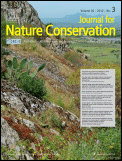
JOURNAL FOR NATURE CONSERVATION
Illuminating Pathways to Effective Conservation StrategiesJOURNAL FOR NATURE CONSERVATION, published by Elsevier GmbH, serves as a pivotal platform for the dissemination of applied and theoretical research in the fields of ecology, nature, and landscape conservation. With an ISSN of 1617-1381 and an E-ISSN of 1618-1093, this esteemed journal has earned a notable reputation, ranking in the Q2 category for both Ecology and Nature and Landscape Conservation in 2023. It is indexed in Scopus with commendable rankings, including #67/211 in Environmental Science - Nature and Landscape Conservation, highlighting its significance within the academic community. The journal’s diverse scope captures the complexities of environmental challenges and offers insights beneficial to researchers, conservationists, and policymakers dedicated to preserving biodiversity and facilitating sustainable practices. Situated in Munich, Germany, the journal has continuously contributed valuable knowledge since its inception in 1991, making it an essential resource for those committed to advancing conservation efforts on a global scale.
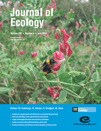
JOURNAL OF ECOLOGY
Shaping the future of ecological research and discourse.JOURNAL OF ECOLOGY, published by Wiley, stands as a leading publication in the field of ecology, evolution, behavior, and plant science, currently positioned in the prestigious Q1 quartile across these categories. Established in 1976, the journal has consistently provided a platform for innovative research and critical discourse related to ecological patterns, processes, and interactions. With its robust Scopus ranking—31st out of 721 in Ecology, Evolution, Behavior and Systematics, and 26th out of 516 in Plant Science—this journal notably reflects the high impact and influence of its articles in the scientific community. Although it does not offer open access options, the journal ensures comprehensive dissemination of pivotal findings to researchers, professionals, and students alike. Located in the United Kingdom at 111 River St, Hoboken, NJ, the JOURNAL OF ECOLOGY remains an essential resource for those dedicated to advancing our understanding of ecological systems and their complexities.

Nature Conservation Research
Leading the charge in ecological and environmental research.Nature Conservation Research is a prominent open-access journal that has been dedicated to advancing the field of conservation science since its inception in 2016. Published by the SARANSK FOND PODDERZKI & RAZVITIA ZAPOVEDNYH in the Russian Federation, this journal serves as a vital platform for researchers, professionals, and students alike, providing critical insights into ecological and environmental issues. With an impressive impact factor and ranked in the second quartile across multiple categories—including Agricultural and Biological Sciences, Earth and Planetary Sciences, Ecology, and Nature and Landscape Conservation—Nature Conservation Research stands at the forefront of impactful scientific discourse. The journal not only aims to disseminate high-quality research findings but also seeks to foster collaboration and innovation in conservation practices globally. By ensuring open access to its content, it promotes widespread dissemination of knowledge, crucial in the fight against biodiversity loss and environmental degradation. Researchers and practitioners contributing to the journal will find themselves at the convergence of science and conservation efforts, paving the way for sustainable ecosystem management.

Journal of Wildlife and Biodiversity
Empowering research to safeguard ecosystems.Journal of Wildlife and Biodiversity, published by Arak University in Iran, is an Open Access journal that has been contributing to the fields of wildlife science and biodiversity since its inception in 2017. With an E-ISSN of 2588-3526, this journal serves as a vital platform for researchers, professionals, and students alike, dedicated to disseminating significant findings related to animal sciences, ecology, and environmental conservation. Despite its current Q4 ranking in various categories (Animal Science, Ecology, and Nature and Landscape Conservation) according to the 2023 metrics, the journal's commitment to advancing knowledge in wildlife and biodiversity remains unwavering. Although the journal's Scopus coverage has been discontinued since 2024, it continues to cater to a wide audience by promoting innovative research and fostering collaborations in the academic community, ultimately aiming to enhance understanding and conservation strategies for wildlife and their habitats.